Registration for Language Courses for Adults, Youth, and Children
Turkish Course Descriptions for Youth and Children
In this course, students who can speak Turkish develop their language knowledge, particularly their reading and writing skills, while having a compelling cultural immersion experience. They engage with the language through diversified and fun activities such as storytelling, songs, games, drama, history and art related to Turkey. The learning materials include some children’s books and resources as per Turkey National Public school system.
Pre-requisites: This class is best suited for students who can speak Turkish. Age range 7-13 years.
Textbook: No textbook required for this course.
Right at the end of this course will be your time for a wonderful vacation. Would you like your children to learn some Turkish before your vacation to Turkey? It would help them make the most of their vacation. Wouldn't that be great, while you are visiting a restaurant, your child is going to be able to order your dinner or help you get around? While you are checking in a hotel, your child will be able to complete the hotel registration formalities, when they meet new people they will be able to introduce themselves to locals, and they will learn some Turkish games to enjoy with the community.
This course focuses on giving them the basic language skills they will need in an interactive and playful manner and includes plenty of background information including cultural practices and commonalities. All the basics you need to make your Turkey trip a success!
*age range: 10-14 years old
Pre-requisites: No prior knowledge of Turkish is expected.
Textbook: No textbook required.
In this course, students who can speak Turkish develop their language knowledge, particularly their reading and writing skills, while having a compelling cultural immersion experience. They engage with the language through diversified and fun activities such as storytelling, songs, games, drama, history and art related to Turkey. The learning materials include some children’s books and resources as per Turkey National Public school system.
Pre-requisites: This class is best suited for students who can speak Turkish. Age range 7-13 years.
Textbook: No textbook required for this course.
Italian Course Descriptions for Youth and Children
In this course, students who can speak Italian develop their language knowledge, particularly their reading and writing skills, while having a compelling cultural immersion experience. They engage with the language through diversified and fun activities such as storytelling, songs, games, drama, history and art related to Italy. The learning materials include some children’s books and resources as per Italian National Public school system.
Pre-requisites: This class is best suited for students who can speak Italian. Age range 7-13 years.
Textbook: No textbook required for this course.
These days writing seems to be out of fashion. Technology and passive information reception has become a routine. So active writing and thinking has become a new goal. Imagination has become a precious skill to be preserved and developed and creative writing is the right tool for everyone and especially for kids who are still new to the world and have unlimited capabilities.
Creative writing is one of the most effective ways to acquire skills of written expressions and creativity, both of unavoidable importance in social life, school or, later, in professional life.
It encourages research, critical thinking, problem solving and communication. It also promotes a taste for reading, improves grammatical skills and is the cradle of innovative ideas. It also plays an important role in managing emotions.
All you need is to involve children in playing with words, creating stories and fantastic worlds, where they manifest their ideas and express emotions, letting their thinking flow freely, without fear of tripping over mistakes.
This is the invitation of this 5 session’s workshop: to give children resources to work with writing in a playful way. As writing is a game, where every player - the writer – is a winner!
Do you want to be a winner too? Then this workshop is for you. We will build “worlds” and their stories, create characters and bring them to life, play with words and their meanings. Let’s defy rules and experiment with looking at what we write differently. Let’s write, create, imagine, travel in the world of imagination.
Pre-requisites: This class is best suited for students who can speak Italian.
Textbook: No books required
*age range: 7-13 years-old
In this course, students who can speak Italian develop their language knowledge, particularly their reading and writing skills, while having a compelling cultural immersion experience. They engage with the language through diversified and fun activities such as storytelling, songs, games, drama, history and art related to Italy. The learning materials include some children’s books and resources as per Italian National Public school system.
Pre-requisites: This class is best suited for students who can speak Italian. Age range 7-13 years.
Textbook: No textbook required for this course.
Arabic Course Descriptions for Youth and Children
Arabic Beginner Level 1 B (30 Hours)
This course is designed for students who know Arabic letters to some extent and at the early stage of learning to read. After passing the previous level, students are able now to greet people, introduce themselves and their friends, and ask simple questions and respond to them. At this level, we will review the Arabic alphabet and pronunciation, train them to read any word in Arabic, have them say short basic reactions about the people who they know and the things they own and the work they do. Students in this course will be able to introduce their family members, describe friends in easy words (tall - short / happy - sad), tell the days of the week and seasons of the year, and refer to the places of things by using adverbs and prepositions (from - to - under - in front of - behind, etc.). The course offers four language skills: speaking, listening, reading and writing; all through exercising a variety of activities and fun games.
Age group: 6-8 years
Prerequisites: Students who joined the former level and know its skills such as the Arabic letters and pronunciation - even if at the minimum extent, and have language skills (please see the previous course and its description).
Course materials: No textbook is utilized in this course. Teachers utilize materials and images suitable for the age group in each lesson. Students are requested to attend the lessons with a notebook, pencils and crayons. Students receive an appropriate rest time during the lesson.
Arabic Beginner Level 1 C (30 Hours)
This course is designed for students who can read new words, able to greet people, and can introduce themselves and their family members. At this level, students will continue what they have learned in the previous course to learn some familiar everyday expressions. They will also learn vocabulary about home, school, transportation and hobbies, and will be able to ask about people, things, time and place. Students, in addition, will learn about the special acts of daily life and express what do they like or dislike, and what they want or do not want. Conversation and role performance will be practiced during the lessons as a way to communicate with the teacher and classmates, while learning simple grammatical rules in Arabic. The course offers four language skills: speaking, listening, reading and writing; all through exercising a variety of activities and fun games.
Age group: 8-12 years
Prerequisites: Students who joined the former level and know its language skills (please see the previous course and its description). Students who already completed the previous level can join this course regardless of their age. Please do not register before contacting the Arabic Language Coordinator (Tel: 33783449) in order to determine the level.
Course materials: No textbook is utilized in this course. Teachers utilize materials and images suitable for the age group in each lesson. Students are requested to attend the lessons with a notebook, pencils and crayons. Students receive an appropriate rest time during the lesson.
Arabic Language Level 1 A (30 Hours) (For Native and Non-Native Speakers)
Many parents face a challenge with the their children in distinguishing and writing the Arabic letters. They always seek to revise the letters for their kids in special courses or before beginning their school time. This course is designed for this purpose; as this foundation level aims to teach the young children the basics of reading by learning the Arabic letters and their pronunciation to read and write properly, so that they become able to analyze and build words out of them. Kids reading weakness results in other performance weaknesses in other materials because it is the means of literacy; as it is one of the reasons for the child's self-confidence and love for reading in the future. In this course, children practice listening and speaking skills using various activities, games, songs and related materials. It aims to build self-confidence in our children and their love and fluency of Arabic.
Age group: 6-8 years
Prerequisites: Students must have attended school and had previously studied and mastered the Arabic alphabets.
Students who joined the former level and know its language skills (please see the previous course and its description)
Course materials: No textbook is utilized in this course. Teachers utilize materials and images suitable for the age group in each lesson. Students are requested to attend the lessons with a notebook, pencils and crayons. Students receive an appropriate rest time during the lesson.
Arabic Language Level 1 A (20 Hours) (For Native and Non-Native Speakers)
Many parents face a challenge with the their children in distinguishing and writing the Arabic letters. They always seek to revise the letters for their kids in special courses or before beginning their school time. This course is designed for this purpose; as this foundation level aims to teach the young children the basics of reading by learning the Arabic letters and their pronunciation to read and write properly, so that they become able to analyze and build words out of them. Kids reading weakness results in other performance weaknesses in other materials because it is the means of literacy; as it is one of the reasons for the child's self-confidence and love for reading in the future. In this course, children practice listening and speaking skills using various activities, games, songs and related materials. It aims to build self-confidence in our children and their love and fluency of Arabic.
Age group: 6-8 years
Prerequisites: Students must have attended school and had previously studied and mastered the Arabic alphabets.
Students who joined the former level and know its language skills (please see the previous course and its description)
Course materials: No textbook is utilized in this course. Teachers utilize materials and images suitable for the age group in each lesson. Students are requested to attend the lessons with a notebook, pencils and crayons. Students receive an appropriate rest time during the lesson.
Arabic Language Skills Level 3 For Native Speakers (20 Hours)
Arabic is considered a big challenge facing those Arab students who received foreign education. This course has been designed to meet this purpose. This course aims to strengthen our students’ language skills, particularly the reading and writing skills (expressing oneself and dictation). It will teach students through stories, songs and animation. Due to the fact that there is a significant weakness in the aspect of self-expression orally and what it needs of dictation and grammar basis, in this course, we review the basic rules and train our students to write by depending on the texts we provide them with, as well as some other language exercises and activities in the classroom.
Age group: 8-11 years
Prerequisites: Students must have completed at least grade 3 of the elementary school. Please do not register before contacting the Arabic Language Coordinator (Tel: 33783449) in order to determine the level
Course materials: No textbook is utilized in this course. Teachers utilize materials and images suitable for the age group in each lesson. Students are requested to attend the lessons with a notebook, pencils and crayons. Students receive an appropriate rest time during the lesson.
Arabic Language Skills Level 4 For Native Speakers (20 Hours)
This course is designed for students of Grades 4 and 5 who are able to read and write well. The course focuses on the four language skills (reading, listening, writing and speaking). In reading, students read short stories and analyze them in terms of (characterization, order of events, and linguistic relationships such as synonyms and antonyms), form sentences out of the vocabulary of the text, and read simple poetic verses and analyze them in a simplified manner. This skill increases and develops their comprehension level, linguistic achievement and thinking abilities. Students also listen to different texts and answer questions on them. We adopt this with them in order to strengthen their effective communication with those around them and further develop it. As for writing skills, students receive the required training to write a story and narrate it in their own vocabulary, and to write biographies (biographies of others) in addition to writing a functional text that they can benefit from in their lives, such as (How to participate in a competition? How do I search for a specific topic? How do I train for a game), etc. In addition, students in this course acquire some spelling skills such as (Hamza forms: catch and conjunctive, nunation “tanwin”, letter “Alif” at the end of a word, doubled verb, deleting letter “Noon” at addition cases, less vocalized letter “Alif” at the end of verbs, doubling the letter “Lam” in spelling, Hamza form at the middle of words, long and short diacritical marks, unwritten but vocalized letter “Alif”). Students, moreover, learn some grammar skills such as (interrogatives, negation, demonstratives, independent/detached pronouns, relative pronouns, verbs and their tenses, sentence types, abbreviated verbs, adverbs and examples explaining the rules of exception, etc.) We will help them build the ability to write short texts.
Age: 8 - 13 years
Requirements: Student must have completed at least Grade 3 of elementary school. Please do not register before contacting the Arabic Language Coordinator (Tel: 33783449) in order to determine the level.
Course materials: No textbook is utilized in this course. Teachers utilize age-appropriate materials that will be emailed out in every lesson. Students are requested to attend the lesson with a notebook, pencils and crayons. Students receive an appropriate break time during the lesson.
Arabic Language Skills Level 5 For Native Speakers (20 Hours)
This course is designed for students of Grades 6 or above and are proficient in reading and writing.
The course focuses on the four language skills (reading, listening, writing and speaking). In reading, students read various texts and analyze their characteristics according to their type, form sentences out of those texts’ vocabulary, and analyze the stories in terms of characters and their material and moral qualities, as well as some linguistic relations (synonyms, anonyms, alliteration and assonance). Students also learn to read poetic verses and fully analyze them in terms of purpose, emotion and rhyme, and study some rhetorical methods such as metaphor and simile, in addition to understanding the implicit meaning and some other linguistic methods. Through this, students develop abilities to understand language, increase their vocabulary bank and develop their thinking skill.
As for writing, students practice to write poetic verses and express their opinion on them, write or summarize a story that has integrated elements. They also receive training on functional writing such as writing an official letter, press report and diary note, and how to write an integrated essay topic.
In addition, students in this course gain some spelling skills such as the multiple forms of Hamza, the less vocalized letter “Aalif” at nouns ends, and infinitive vs. non-infinitive forms of Arabic verbs. They also learn some rules on how to add or delete letters from words. Some grammar skills are also taught to students such as the nominative cases, types of predicate, imperative verbs, nouns forms, forms of inflection, adjectives, compound numbers, past participle and passive verbs. Students also begin to study morphology in order to better recognize the morphological aspects, abstract forms and more, and sound vs. unsound verbs.
Age: 11 - 14 years
Requirements: Student must have completed at least Grade 5 of elementary school.
Course materials: No textbook is utilized in this course. Teachers utilize age-appropriate materials that will be emailed out in every lesson. Students are requested to attend the lesson with a notebook, pencils and crayons.
Students receive an appropriate break time during the lesson.
Arabic Language Skills Level 1 (30 Hours)
Many parents face a challenge with the their children in distinguishing and writing the Arabic letters. They always seek to revise the letters for their kids in special courses or before beginning their school time. This course is designed for this purpose; as this foundation level aims to teach the young children the basics of reading by learning the Arabic letters and their pronunciation to read and write properly, so that they become able to analyze and build words out of them. Kids reading weakness results in other performance weaknesses in other materials because it is the means of literacy; as it is one of the reasons for the child's self-confidence and love for reading in the future. In this course, children practice listening and speaking skills using various activities, games, songs and related materials. It aims to build self-confidence in our children and their love and fluency of Arabic.
Age group: 6-8 years
Prerequisites: Students who joined the former level and know its language skills (please see the previous course and its description)
Course materials: No textbook is utilized in this course. Teachers utilize materials and images suitable for the age group in each lesson. Students are requested to attend the lessons with a notebook, pencils and crayons. Students receive an appropriate rest time during the lesson.
Arabic Language Skills Level 3 (30 Hours)
Arabic is considered a big challenge facing those Arab students who received foreign education. This course has been designed to meet this purpose. This course aims to strengthen our students’ language skills, particularly the reading and writing skills (expressing oneself and dictation). It will teach students through stories, songs and animation. Due to the fact that there is a significant weakness in the aspect of self-expression orally and what it needs of dictation and grammar basis, in this course, we review the basic rules and train our students to write by depending on the texts we provide them with, as well as some other language exercises and activities in the classroom.
Age group: 8-11 years
Prerequisites: Students must have completed at least grade 3 of the elementary school. Please do not register before contacting the Arabic Language Coordinator (Tel: 33783449) in order to determine the level
Course materials: No textbook is utilized in this course. Teachers utilize materials and images suitable for the age group in each lesson. Students are requested to attend the lessons with a notebook, pencils and crayons. Students receive an appropriate rest time during the lesson.
Arabic Language Skills Level 4 (30 Hours)
This course is designed for students of Grades 4 and 5 who are able to read and write well. The course focuses on the four language skills (reading, listening, writing and speaking). In reading, students read short stories and analyze them in terms of (characterization, order of events, and linguistic relationships such as synonyms and antonyms), form sentences out of the vocabulary of the text, and read simple poetic verses and analyze them in a simplified manner. This skill increases and develops their comprehension level, linguistic achievement and thinking abilities. Students also listen to different texts and answer questions on them. We adopt this with them in order to strengthen their effective communication with those around them and further develop it. As for writing skills, students receive the required training to write a story and narrate it in their own vocabulary, and to write biographies (biographies of others) in addition to writing a functional text that they can benefit from in their lives, such as (How to participate in a competition? How do I search for a specific topic? How do I train for a game), etc. In addition, students in this course acquire some spelling skills such as (Hamza forms: catch and conjunctive, nunation “tanwin”, letter “Alif” at the end of a word, doubled verb, deleting letter “Noon” at addition cases, less vocalized letter “Alif” at the end of verbs, doubling the letter “Lam” in spelling, Hamza form at the middle of words, long and short diacritical marks, unwritten but vocalized letter “Alif”). Students, moreover, learn some grammar skills such as (interrogatives, negation, demonstratives, independent/detached pronouns, relative pronouns, verbs and their tenses, sentence types, abbreviated verbs, adverbs and examples explaining the rules of exception, etc.) We will help them build the ability to write short texts.
Age: 8 - 13 years
Requirements: Student must have completed at least Grade 3 of elementary school. Please do not register before contacting the Arabic Language Coordinator (Tel: 33783449) in order to determine the level.
Course materials: No textbook is utilized in this course. Teachers utilize age-appropriate materials that will be emailed out in every lesson. Students are requested to attend the lesson with a notebook, pencils and crayons. Students receive an appropriate break time during the lesson.
Arabic Language Level 1 A (30 Hours) (For Native and Non-Native Speakers)
Many parents face a challenge with the their children in distinguishing and writing the Arabic letters. They always seek to revise the letters for their kids in special courses or before beginning their school time. This course is designed for this purpose; as this foundation level aims to teach the young children the basics of reading by learning the Arabic letters and their pronunciation to read and write properly, so that they become able to analyze and build words out of them. Kids reading weakness results in other performance weaknesses in other materials because it is the means of literacy; as it is one of the reasons for the child's self-confidence and love for reading in the future. In this course, children practice listening and speaking skills using various activities, games, songs and related materials. It aims to build self-confidence in our children and their love and fluency of Arabic.
Age group: 5-7 years
Prerequisites: Students must have attended school and had previously studied and mastered the Arabic alphabets. Students who joined the former level and know its language skills (please see the previous course and its description)
Course materials: No textbook is utilized in this course. Teachers utilize materials and images suitable for the age group in each lesson. Students are requested to attend the lessons with a notebook, pencils and crayons. Students receive an appropriate rest time during the lesson.
Arabic Beginner Level 1 B (20 Hours)
This course is designed for students who know Arabic letters to some extent and at the early stage of learning to read. After passing the previous level, students are able now to greet people, introduce themselves and their friends, and ask simple questions and respond to them. At this level, we will review the Arabic alphabet and pronunciation, train them to read any word in Arabic, have them say short basic reactions about the people who they know and the things they own and the work they do. Students in this course will be able to introduce their family members, describe friends in easy words (tall - short / happy - sad), tell the days of the week and seasons of the year, and refer to the places of things by using adverbs and prepositions (from - to - under - in front of - behind, etc.). The course offers four language skills: speaking, listening, reading and writing; all through exercising a variety of activities and fun games.
Age group: 6-8 years
Prerequisites: Students who joined the former level and know its skills such as the Arabic letters and pronunciation - even if at the minimum extent, and have language skills (please see the previous course and its description).
Course materials: No textbook is utilized in this course. Teachers utilize materials and images suitable for the age group in each lesson. Students are requested to attend the lessons with a notebook, pencils and crayons. Students receive an appropriate rest time during the lesson.
Arabic Language Skills Level 3 (20 Hours)
Arabic is considered a big challenge facing those Arab students who received foreign education. This course has been designed to meet this purpose. This course aims to strengthen our students’ language skills, particularly the reading and writing skills (expressing oneself and dictation). It will teach students through stories, songs and animation. Due to the fact that there is a significant weakness in the aspect of self-expression orally and what it needs of dictation and grammar basis, in this course, we review the basic rules and train our students to write by depending on the texts we provide them with, as well as some other language exercises and activities in the classroom.
Age group: 8-11 years
Prerequisites: Students must have completed at least grade 3 of the elementary school. Please do not register before contacting the Arabic Language Coordinator (Tel: 33783449) in order to determine the level
Course materials: No textbook is utilized in this course. Teachers utilize materials and images suitable for the age group in each lesson. Students are requested to attend the lessons with a notebook, pencils and crayons. Students receive an appropriate rest time during the lesson.
Arabic Language Skills Level 4 (20 Hours)
This course is designed for students of Grades 4 and 5 who are able to read and write well. The course focuses on the four language skills (reading, listening, writing and speaking). In reading, students read short stories and analyze them in terms of (characterization, order of events, and linguistic relationships such as synonyms and antonyms), form sentences out of the vocabulary of the text, and read simple poetic verses and analyze them in a simplified manner. This skill increases and develops their comprehension level, linguistic achievement and thinking abilities. Students also listen to different texts and answer questions on them. We adopt this with them in order to strengthen their effective communication with those around them and further develop it. As for writing skills, students receive the required training to write a story and narrate it in their own vocabulary, and to write biographies (biographies of others) in addition to writing a functional text that they can benefit from in their lives, such as (How to participate in a competition? How do I search for a specific topic? How do I train for a game), etc. In addition, students in this course acquire some spelling skills such as (Hamza forms: catch and conjunctive, nunation “tanwin”, letter “Alif” at the end of a word, doubled verb, deleting letter “Noon” at addition cases, less vocalized letter “Alif” at the end of verbs, doubling the letter “Lam” in spelling, Hamza form at the middle of words, long and short diacritical marks, unwritten but vocalized letter “Alif”). Students, moreover, learn some grammar skills such as (interrogatives, negation, demonstratives, independent/detached pronouns, relative pronouns, verbs and their tenses, sentence types, abbreviated verbs, adverbs and examples explaining the rules of exception, etc.) We will help them build the ability to write short texts.
Age: 8 - 13 years
Requirements: Student must have completed at least Grade 3 of elementary school. Please do not register before contacting the Arabic Language Coordinator (Tel: 33783449) in order to determine the level.
Course materials: No textbook is utilized in this course. Teachers utilize age-appropriate materials that will be emailed out in every lesson. Students are requested to attend the lesson with a notebook, pencils and crayons. Students receive an appropriate break time during the lesson.
Arabic Language Skills Level 5 (30 Hours)
This course is designed for students of Grades 6 or above and are proficient in reading and writing.
The course focuses on the four language skills (reading, listening, writing and speaking). In reading, students read various texts and analyze their characteristics according to their type, form sentences out of those texts’ vocabulary, and analyze the stories in terms of characters and their material and moral qualities, as well as some linguistic relations (synonyms, anonyms, alliteration and assonance). Students also learn to read poetic verses and fully analyze them in terms of purpose, emotion and rhyme, and study some rhetorical methods such as metaphor and simile, in addition to understanding the implicit meaning and some other linguistic methods. Through this, students develop abilities to understand language, increase their vocabulary bank and develop their thinking skill.
As for writing, students practice to write poetic verses and express their opinion on them, write or summarize a story that has integrated elements. They also receive training on functional writing such as writing an official letter, press report and diary note, and how to write an integrated essay topic.
In addition, students in this course gain some spelling skills such as the multiple forms of Hamza, the less vocalized letter “Aalif” at nouns ends, and infinitive vs. non-infinitive forms of Arabic verbs. They also learn some rules on how to add or delete letters from words. Some grammar skills are also taught to students such as the nominative cases, types of predicate, imperative verbs, nouns forms, forms of inflection, adjectives, compound numbers, past participle and passive verbs. Students also begin to study morphology in order to better recognize the morphological aspects, abstract forms and more, and sound vs. unsound verbs.
Age: 11 - 14 years
Requirements: Student must have completed at least Grade 5 of elementary school.
Course materials: No textbook is utilized in this course. Teachers utilize age-appropriate materials that will be emailed out in every lesson. Students are requested to attend the lesson with a notebook, pencils and crayons. Students receive an appropriate break time during the lesson.
Arabic Language Skills Level 5 For Native Speakers (20 Hours)
This course is designed for students of Grades 6 or above and are proficient in reading and writing.
The course focuses on the four language skills (reading, listening, writing and speaking). In reading, students read various texts and analyze their characteristics according to their type, form sentences out of those texts’ vocabulary, and analyze the stories in terms of characters and their material and moral qualities, as well as some linguistic relations (synonyms, anonyms, alliteration and assonance). Students also learn to read poetic verses and fully analyze them in terms of purpose, emotion and rhyme, and study some rhetorical methods such as metaphor and simile, in addition to understanding the implicit meaning and some other linguistic methods. Through this, students develop abilities to understand language, increase their vocabulary bank and develop their thinking skill.
As for writing, students practice to write poetic verses and express their opinion on them, write or summarize a story that has integrated elements. They also receive training on functional writing such as writing an official letter, press report and diary note, and how to write an integrated essay topic.
In addition, students in this course gain some spelling skills such as the multiple forms of Hamza, the less vocalized letter “Aalif” at nouns ends, and infinitive vs. non-infinitive forms of Arabic verbs. They also learn some rules on how to add or delete letters from words. Some grammar skills are also taught to students such as the nominative cases, types of predicate, imperative verbs, nouns forms, forms of inflection, adjectives, compound numbers, past participle and passive verbs. Students also begin to study morphology in order to better recognize the morphological aspects, abstract forms and more, and sound vs. unsound verbs.
Age: 11 - 14 years
Requirements: Student must have completed at least Grade 5 of elementary school.
Course materials: No textbook is utilized in this course. Teachers utilize age-appropriate materials that will be emailed out in every lesson. Students are requested to attend the lesson with a notebook, pencils and crayons.
Students receive an appropriate break time during the lesson.
Arabic for IGCSE students, O-Level
This course is designed for students taking the Arabic language test IGCSE whose mother tongue is Arabic.
Many foreign school students have weak Arabic language skills; be it speaking, writing or understanding while they need strong language skills in order to pass the Arabic test of IGCSE. This course, hence, is designed to fit the needs of IGCSE students. It aims to strengthen the students in these skills and meet their learning needs.
Course content:
- Reviewing some spelling skills such as (the forms of “Hamza” as a glottal stop and letter, the non-glottal stop form of the letter Alif, omitting and adding letters, etc.) which all help the students write correctly.
- Reviewing some grammar skills such as (dual and masculine plural forms of nouns and verbs, the five nouns, the five verbs, the accusative case of nouns, the nominative case, and the jussive mood/aprocoped) as well as other skills that have a direct impact on writing.
- Training the students on the skill of reading comprehension by reading various texts, discussing them, and working on solving related questions.
- Training the students on the paraphrasing of ideas of a selected reading text; all by using the students’ own style and without copying the writer’s words.
- Training the students on the skill of summarizing texts, and merging the ideas of two texts into one text by using the students’ own style.
- Training the students on the skills of debate and the formulation of persuasive arguments.
- Training the students on the skill of literary description.
- Training the students on the skill of narration.
Prerequisites: Students must have completed at least Grade 9.
Course materials: Students are trained on models from previous exams (past papers) in addition to the possibility of the teacher’s use of other texts that serve the curriculum and standards. It is worth noting that there is no recommended book from Cambridge but, rather, it recommends exercises for exams; and this is what our teachers do during such language courses.
Arabic Language Level 1 A (30 Hours) (For Native and Non-Native Speakers)
Many parents face a challenge with the their children in distinguishing and writing the Arabic letters. They always seek to revise the letters for their kids in special courses or before beginning their school time. This course is designed for this purpose; as this foundation level aims to teach the young children the basics of reading by learning the Arabic letters and their pronunciation to read and write properly, so that they become able to analyze and build words out of them. Kids reading weakness results in other performance weaknesses in other materials because it is the means of literacy; as it is one of the reasons for the child's self-confidence and love for reading in the future. In this course, children practice listening and speaking skills using various activities, games, songs and related materials. It aims to build self-confidence in our children and their love and fluency of Arabic.
Age group: 6-8 years
Prerequisites: Students must have attended school and had previously studied and mastered the Arabic alphabets.
Students who joined the former level and know its language skills (please see the previous course and its description)
Course materials: No textbook is utilized in this course. Teachers utilize materials and images suitable for the age group in each lesson. Students are requested to attend the lessons with a notebook, pencils and crayons. Students receive an appropriate rest time during the lesson.
Panelists
 Dr. Márta Seresi
Dr. Márta Seresi
(PhD) is a senior lecturer at the Department of Translator and Interpreter Training at Eötvös Loránd University, Budapest, where she teaches consecutive and simultaneous interpretation between Hungarian and French. She also organises international virtual classes for students of the European Masters in Conference Interpreting (EMCI) program in cooperation with the European Union’s institutions’ interpreting services. She also participates in the work of the ELTE Doctoral Program of Translation. Her main area of research is remote interpreting. She is currently the Vice-Chair of WG7 (Language professionals) in the European Union’s LITHME COST Action. She is also an accredited freelancer conference interpreter of the European Institutions and works regularly for the EU institutions in Brussels and Luxembourg.
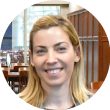 Dr. Petra Lea Láncos
Dr. Petra Lea Láncos
Dr. Petra graduated from Pázmány Péter Catholic University in 2003. Before obtaining her PhD, she was a junior research fellow at the Max Planck Institute for Comparative Law and Public International Law (Heidelberg) in 2006-2007. She is an associate professor at the Department of European Law at Pázmány Péter Catholic University (Budapest) since 2009. Between 2016-2019, she was a research fellow at the Deutsches Forschungsinstitut für öffentliche Verwaltung (Speyer). Besides her academic career, she worked at the Office of the Commissioner for Fundamental Rights (2013-2014), at the National Media and Infocommunications Authority (2015-2016), and currently she works at the Constitutional Court of Hungary (since 2019). She has been working as a freelance interpreter for the EU institutions since 2011. She has been working as the Editor of the Hungarian Yearbook of International Law and European Law since its establishment (2013).
 Dr. Julie Boeri
Dr. Julie Boeri
Julie Boéri holds a PhD in Translation and Intercultural Studies from the University of Manchester (UK). Before joining Hamad Bin Khalifa University, she has been a lecturer in Interpreting at the Pompeu Fabra University (Barcelona, Spain) and in Communication Studies at the University of Nice Sophia Antipolis (France). Her work focuses on social change and ascendant innovation in digital and non-digital environments with a particular interest for narrative convergence and divergence among actors and communities. Her ethnographic studies of interactions, practices and artefacts in social organizations and media spaces seek to account for the dynamics of dominance and resistance at play in cross-cultural and cross-linguistic communication encounters. She has extensively published in English, Spanish and French in Routledge and in academic journals such as The Translator, Questions de communication, Revue Française des Sciences de l’Information et de la Communication. In her capacity as Chair of the international conferences committee of IATIS (International Association of Translation and Intercultural Studies), she is in charge of developing translation solutions for IATIS international and itinerant academic conferences. Read more...
 Dr. Deborah Giustini
Dr. Deborah Giustini
A Postdoctoral Research Fellow in Sociology at the National Research University Higher School of Economics - Institute for Statistical Studies and Economics of Knowledge, and a Research Fellow at KU Leuven. She is currently also Visiting Professor at HBKU's College of Humanities and Social Sciences. She has a PhD in Sociology from the University of Manchester and works on issues of highly-skilled but invisible work and precarious employment, with a particular focus on the interpreting industry in comparative, trans-national contexts. She has vastly published on these issues on outlets such as The British Journal of Sociology and Asian Anthropology.
 Dr. Sonja Kitanovska-Kimovska
Dr. Sonja Kitanovska-Kimovska
A translator and Associate Professor of English and Translation at the Department of Translation and Interpreting at Ss Cyril and Methodius University (UKIM) in Skopje. Sonja has earned her MPhil degree in English and Applied Linguistics from Cambridge University, UK, as a Chevening Scholar, and a PhD in Translation from UKIM. She has extensive experience in specialized translation (mainly in legal, business, medicine, marketing and IT/Telecom) and is an authorized court translator with the Ministry of Justice of the Republic of North Macedonia. She has published a book on the translation of style (based on a corpus of Shakespeare’s plays and their Macedonian translations) and a number of scholarly research articles. Her research interests include translation and style, translator training and the translation profession.
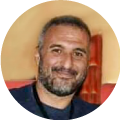 Dr. Hicham Benmokhtari
Dr. Hicham Benmokhtari
Doctor (PHD) Benmokhtari was appointed at the English Department, University of Bejaia in 2014. He had got a license (B.A) degree in translation studies 2004-2008, his M.A degree in translation studies: didactics of languages and terminology 2012-2014, and his doctorate degree in translation studies 2014-2018 from the University of Tlemcen. Algeria. He obtained the authorization to direct research by the Translation Institute- Algiers. He was also appointed as head of the scientific committee of the French department in Khemis Meliana University. Benmokhtari is now a professor in the faculty of foreign languages. He is now a lecturer at Oran 2 university. He teaches a wide variety of courses including English as a foreign language, introduction to translation studies, social and Human sciences courses and specialized translation for B.A and Ph. D students, focusing on translation, discourse analysis, psycholinguistics, interpretation, sociolinguistics, among others. As a researcher, he has written articles in English and Arabic in local, regional and international journals on various topics related to translation studies and didactics.
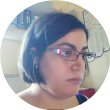 Dr. Khadidja Merakchi
Dr. Khadidja Merakchi
Dr. Khadidja joined the Department of Languages and Intercultural Studies (LINCS) at Heriot Watt University in 2019 as an assistant professor. She teaches translation and interpreting to undergraduate and postgraduate students. She has previously taught at UCL and at the University of Surrey from where she graduated with a PhD in Translation and Interpreting Studies in 2017 and at the University of Algiers from 2007 to 2015. Khadidja’s research interests are: popular science discourse, corpus-based and corpus-driven approaches to translation and interpreting studies, CAT tools and terminology management. She has many publications and has presented at many international conferences. She is a member of various research and professional bodies, notably CTISS, IATIS, RAAM and EST.
 Dr. Claudia Angelleli
Dr. Claudia Angelleli
Professor Claudia V. Angelelli is Chair in Multilingualism and Communication at Heriot-Watt University (Edinburgh campus), UK, Emeritus Professor of Spanish Linguistics at San Diego State University, US and Visiting Professor at Beijing University of Foreign Studies. Her research sits at the intersection of sociolinguistics, applied linguistics and translation and interpreting studies. She holds a Ph.D. from Stanford University, a Master of Arts (and two PG Certificates) from MIIS (Middlebury Institute of International Studies at Monterey) and a Bachelor of Arts from Universidad Católica Argentina.
 Dr. Emília Perez
Dr. Emília Perez
An associate professor and head of the Department of Translation Studies, Constantine the Philosopher University in Nitra, Slovakia. In both research and training she focuses on the field of audiovisual translation and media accessibility, translator competences and business administration in translation. Since 2019, she has been a member of the Executive Board of the European Master’s in Translation network (EMT) established by the DGT of the European Commission. In 2020 she set up the EMT working group on AVT and media accessibility training in Europe (31 members from 13 countries) which she leads to the present day. She is a member of the European Association for Studies in Screen Translation (ESIST), the editorial board of the journal Bridge: Trends and Traditions in Translation and Interpreting Studies and the scientific board of the Journal of Audiovisual Translation (JAT). She has also participated as an invited expert and trainer in domestic and international initiatives in AVT, e.g. the One World Film Festival 2020; the Directorate-General for Translation of the European Parliament, Luxembourg (2020); the Directorate-General for Education, Youth, Sport and Culture of the European Commission, Brussels (2021).
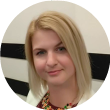 Dr. Soňa Hodáková
Dr. Soňa Hodáková
An assistant professor at the Department of Translation Studies at the Faculty of Arts of Constantine the Philosopher University in Nitra. She lectures on translation, interpreting and psychosocial aspects of interpreting. She also has a postgraduate degree in psychology. In her research she focuses on psychological and cognitive aspects of interpreting, e.g. stress, effort, working memory and motivation. She works as a freelance translator and conference interpreter. She is a member of the examining committee for court interpreters at the Institute of Interpreting in Nitra, Slovakia. She is Editor-in-Chief of the scientific journal Bridge: Trends and Traditions in Translation Studies.
 Dr. Laura Ramirez Polo
Dr. Laura Ramirez Polo
An Assistant Teaching Professor at Rutgers, where she coordinates the Translation and Interpreting program. She holds a PhD in Translation from the University of Valencia, Spain. She has previously worked as a lecturer at the University of Illinois, USA, and at the Universidad de Valencia, Spain. She has more than 15 years of experience in training translators and interpreters, as well as translating from English and German into Spanish. She has also worked as a translator and terminologist for international organizations such as the European Parliament and WIPO.
 Dr. Chelo Vargas Sierra
Dr. Chelo Vargas Sierra
Dr. Chelo earned her Master’s Degree in Translation and Interpreting and a PhD in Translation from University of Alicante (UA). She has also completed doctoral courses in Computer Applications at the same university, and earned a master’s degree in Terminology from Institute for Applied Linguistics (IULA, Pompeu Fabra University) and a master’s degree in Audiovisual Translation and Localization (University of Cádiz). She is a Senior Lecturer at University of Alicante and teaches Translation, Terminology and CAT Tools in Graduate and Postgraduate courses (UA, IULA, ISTRAD, Universidad Ricardo Palma). She has also given international seminars at the European Commission in Brussels and Luxembourg, Universidad Nacional in Costa Rica, Universidad Ricardo Palma, Universidad Peruana de Ciencias Aplicadas, Universidad César Vallejo, Colegio de Traductores (Professional Translators’ Association) in Peru, Universidad Autonoma (Regional Autonomous University) of Manizales (Colombia), Coventry University (UK) and University of Applied Sciences of Salzburg (Austria). Her main lines of research for which she has both published several articles and participated in seminars and conferences are: terminology, terminography, corpus linguistics, specialized translation and computer-aided translation.
 Dr. Miguel A. Jimenez-Crespo
Dr. Miguel A. Jimenez-Crespo
Holds a PhD in Translation and Interpreting Studies from the University of Granada, Spain. He is a Professor in the Department of Spanish and Portuguese, Rutgers University, and he directs the Masters program and the undergraduate certificate in Spanish – English Translation and Interpreting. He is the author of Crowdsourcing and Online Collaborative Translations: Expanding the Limits of Translation Studies published by John Benjamins in 2017, as well as Translation and Web Localization published by Routledge in 2013.
 Dr. Laura Ramirez Polo
Dr. Laura Ramirez Polo
An Assistant Teaching Professor at Rutgers, where she coordinates the Translation and Interpreting program. She holds a PhD in Translation from the University of Valencia, Spain. She has previously worked as a lecturer at the University of Illinois, USA, and at the Universidad de Valencia, Spain. She has more than 15 years of experience in training translators and interpreters, as well as translating from English and German into Spanish. She has also worked as a translator and terminologist for international organizations such as the European Parliament and WIPO.
 Dr. María del Mar Sánchez Ramos
Dr. María del Mar Sánchez Ramos
An associate professor in the Department of Modern Philology at the University of Alcalá (Madrid, Spain), where she teaches localization and specialized translation. She holds a PhD in translation and interpreting from the Universitat Jaume I (Castellón, Spain). Her research is focused on translation and technology, corpus linguistics and discourse analysis. She is also an active member of different research projects related to the specific (technological) needs of non-governmental organizations in multilingual settings, and the European Parliament’s representation of the refugee crisis.
 Dr. Carmen Mª Cedillo
Dr. Carmen Mª Cedillo
Carmen holds the Extraordinary PhD Award from the University of Alcalá and has been a laureate of the Conférence Internationale Permanente d’Instituts Universitaires de Traducteurs et Interprètes in 2019 in recognition of the outstanding quality os her doctoral dissertation. She also holds a Degree in Translation and Interpreting from the Universidad Pablo de Olavide and a Master's Degree in Intercultural Communication, Interpreting and Translation in Public Services from the Universidad de Alcalá. She has taught on the Degree in Translation and Interpreting at the Universidad Pablo de Olavide and has been teaching on the Master's Degree she studied since 2012. She is currently an associate lecturer at the Universidad Alfonso X El Sabio and an external collaborator at the Universidad Internacional de Valencia. She is also an active member of the FITISPos research group and the AFIPTISP association and is on the editorial board of the FITISPos International Journal. She has published several articles on the relationship between Public Service Interpreting and Translation and the sociology of the professions and the media, most recently for Lebende Sprachen: "The denominational plurality of Public Service Interpreting and Translation via Twitter and YouTube". She has also given numerous lectures and workshops on this field of study at national and international level, most recently at the 33rd Conference of the Canadian Association for Translation Studies and the 18th International Conference of Translation in Malaysia.
 Ms. Aleksandra Ożarowska
Ms. Aleksandra Ożarowska
A translator and a Ph.D. candidate at the University of Warsaw, where she teaches translation. She is also a lecturer in English at the Aleksander Zelwerowicz National Academy of Dramatic Art in Warsaw. Her research focuses on audiovisual translation and contemporary approaches to translation studies. Translating from English, Polish, German and Italian, she cooperates with major Polish publishing houses and opera houses. She was awarded scholarships by the University of Tübingen, Johannes Gutenberg University Mainz and University of Bonn, in 2020 she received the Polish Ministry of Science and Higher Education Scholarship for Outstanding Young Researchers and in 2021 she was granted the Fulbright Scholarship.
Program and Registration
For Interpreting:
1. You can download and test logging into the Olyusei App now, which is available for mobile devices on the Google Play and the App Store
2. Enter event code: chss and PIN: 2021
3. Choose the language
For Q&A:
Please direct your questions to "All Panelists" through the Q&A box.
For Sign Language:
Please set your "Layout" view to "Focus".
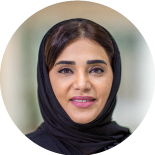 Dr. Amal Al-Malki, Founding Dean of the College of Humanities and Social Sciences, Hamad Bin Khalifa University
Dr. Amal Al-Malki, Founding Dean of the College of Humanities and Social Sciences, Hamad Bin Khalifa University
Role of Professional Translators Post Pandemic. History, Economics and Sociopolitics | 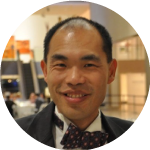 Dr. Henry Liu
Dr. Henry Liu
Chair Dr. Ali Almanna
Teamwork in the Virtual Booth: Conference Interpreters’ Experiences with RSI Platforms |  Dr. Márta Seresi and
Dr. Márta Seresi and  Dr. Petra Láncos
Dr. Petra Láncos
Interpreters’ Narratives of the COVID-19 Pandemic: A Focus on Qatar |  Dr. Julie Boéri and
Dr. Julie Boéri and  Dr. Deborah Giustini
Dr. Deborah Giustini
Work-family Interface and Job Outcomes Among Translators and Interpreters: Do COVID-19 and Parenting Alter the Relationship? |  Dr. Sonja Kitanovska-Kimovska
Dr. Sonja Kitanovska-Kimovska
Teaching Remote Translation in the Time of Covid 19: Translation Division at the University of Tlemcen in Algeria as a Model |  Dr. Hicham Benmokthari (The presentation will be delivered in Arabic and English interpreting will be provided)
Dr. Hicham Benmokthari (The presentation will be delivered in Arabic and English interpreting will be provided)
Integrated Self-assessment Activities in Online and Blended Learning: Towards Increased Interpreting Trainees’ Autonomy |  Dr. Khadidja Merakchi and
Dr. Khadidja Merakchi and  Dr. Claudia Angelleli
Dr. Claudia Angelleli
Translator Training After the COVID-19 Outbreak: Personal and Interpersonal Competence Development in Trainees |  Dr. Emília Perez and
Dr. Emília Perez and  Dr. Soňa Hodáková
Dr. Soňa Hodáková
Alignment and Diversity: Backward Design, Universal Design for Learning and the Teaching of Translation Technologies During the COVID-19 Crisis |  Dr. Laura Ramirez and
Dr. Laura Ramirez and  Dr. Chelo Vargas Sierra
Dr. Chelo Vargas Sierra
Hindsight, Foresight, and 2020 Vision: Translation Theory, Training, and Praxis in a Global Pandemic | 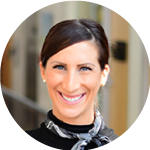 Dr. Renée Desjardins
Dr. Renée Desjardins
COVID-19 Meets Twitter: A Corpus-based Analysis of COVID-19-related Tweets of Trump and their Translations in the Media |  Dr. Miguel Jiménez-Crespo and
Dr. Miguel Jiménez-Crespo and  Dr. Laura Ramirez
Dr. Laura Ramirez
‘Localizing’ COVID-19: Multilingual Web Accessibility in Healthcare Emergencies |  Dr. María del Mar Sánchez Ramos and
Dr. María del Mar Sánchez Ramos and  Dr. Carmen Cedillo Corrochano
Dr. Carmen Cedillo Corrochano
Love (to Opera) in the Time of Pandemic: Recent Trends in Operatic Surtitling |  Ms. Aleksandra Ożarowska
Ms. Aleksandra Ożarowska
 Dr. Hendrik Kockaert, Director of Translation and Interpreting Studies Department
Dr. Hendrik Kockaert, Director of Translation and Interpreting Studies Department
Keynote Speakers
 Henry is a champion for translators, interpreters and terminologists worldwide.
Henry is a champion for translators, interpreters and terminologists worldwide.
A highly respected consultant interpreter for heads of states, trade and diplomatic missions, Henry is also a published translator of poetry, plays and operas. Most people will know Henry as a seasoned provocative keynote speaker in Oceania, North America, Latin America, Europe, Asia and Africa with particular emphasis on branding and visibility.
An opinionated advocate of professorial organisations and a strong believer in trans-national and multidisciplinary co-operation, Henry was elected 13th President of the International Federation of Translators (FIT), an NGO with consultative status with UNESCO, ECOSOC and WIPO, and was instrumental in the adoption of the UN General Assembly Resolution 71/288 in recognition of the role of professional translation in connecting nations and fostering peace, understanding and development, as well as the worldwide recognition of 30th September as International Translation Day (ITD).
He is also a member of the CHSS Advisory Council.
 Bionote:
Bionote:
Renée Desjardins is associate professor at the Université de Saint-Boniface, and the author of Translation and Social Media: In Theory, in Training, and in Professional Practice (Palgrave Macmillan, 2017), and co-editor of the recent When Translation Goes Digital: Case Studies and Critical Reflections (Palgrave Macmillan, 2021). She has been researching and writing about translation and social media for more than a decade and has published on the subject in a number of outlets.
Hindsight, Foresight, and 2020 Vision: translation theory, training, and praxis in a global pandemic.
Over the years, the subject of automation has held a central place in Translation Studies, specifically, the threat of automation. Concerns about machine-output surpassing human-output have existed ever since the IBM experiments of the 1950s. In the last ten years, the focus has shifted from the quality of the output to how we might instead reframe the human-machine relationship altogether – an arguably more promising and fertile direction for our profession and field. On March 11 2020, the World Health Organization characterized Covid-19 as a global pandemic. Since, it has seemed as if time has both accelerated, decelerated, and, in some cases, altogether stopped. Collectively, on a global-scale, we are experiencing an unprecedented “integral accident” (cf. Virilio) that has also triggered other significant ripples and waves: the heightening of racial injustices; the resurgence and rise of various social movements in response to these injustices; the accelerated democratization and dissemination of knowledge; the necessity and inescapability of networked digital technology – to name only these.
In this talk, I examine translation in this “zero time” (cf. Virilio; Charron) of an on-going pandemic in three key areas: theory, training, and praxis. I argue that effective public health communication, for instance, requires thinking about the “layered materiality” (cf. Littau) of translation and the avoidance of piecemeal conceptualizations that are rather unhelpful in multimodal transnational digital contexts. I interrogate current training requirements as well as pedagogical practices to see if we could not restructure our academic and training programs in ways that are more in line with the principles of access, equity, diversity, and inclusion. Finally, I show ways in which translation is used in innovative and perhaps unexpected ways on social media, thus shifting what we typically associate with ‘professional translation’. In these analyses, I share what I hope to be a more nuanced discussion around human-machine relationships in translation, inclusive and equitable translation pedagogy at a time when the elitism and exclusion of academic instruction is underscored, and how translation has become a way to (re)connect in these uncertain times.
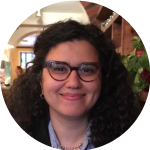 Dima Ayoub is an Assistant Professor of Arabic and C.V. Starr Junior Faculty Fellow in International Studies at Middlebury College where she was also the former director of the Middle East studies program. Her book manuscript Paratext and Power: Modern Arabic Literature in Translation rewrites the social and cultural history of modern Arabic literature in translation by centering the role of publishers, translators and paratexts, in addition to writers. She specializes in translation studies, gender and postcolonial studies. Parallel to her book project, Dr. Ayoub is developing a digital archive of modern Arabic literature in English, French, German and Spanish translation. Her most recent publications appeared in the Journal of Translation Studies, the Journal of Arabic Literature, Middle Eastern Literatures and in the edited collection, Multilingual Literature as World Literature with Bloomsbury.
Dima Ayoub is an Assistant Professor of Arabic and C.V. Starr Junior Faculty Fellow in International Studies at Middlebury College where she was also the former director of the Middle East studies program. Her book manuscript Paratext and Power: Modern Arabic Literature in Translation rewrites the social and cultural history of modern Arabic literature in translation by centering the role of publishers, translators and paratexts, in addition to writers. She specializes in translation studies, gender and postcolonial studies. Parallel to her book project, Dr. Ayoub is developing a digital archive of modern Arabic literature in English, French, German and Spanish translation. Her most recent publications appeared in the Journal of Translation Studies, the Journal of Arabic Literature, Middle Eastern Literatures and in the edited collection, Multilingual Literature as World Literature with Bloomsbury.
Korean Language Program
Welcome to Our NEW Korean Program!
Have you ever heard "Hallyu", which is known as the wave of popularity for South Korean culture? It is a collective term used to refer to the phenomenal growth of Korean culture encompassing everything from music, movies, drama and even Korean cuisine.
The number of Hallyu fans surged to 89.19 million worldwide in 2018, according to the statistics conducted by Korea Foundation. This drastic increase in the global fandom has been partially attributed to the world’s biggest boy band, BTS, for its excellent performance. Do you know BTS? Have you ever watched Korean dramas and movies? If you do, you might become a Hallyu fan!
Why don’t you fill up your interest and passion for learning the Korean language with us?
TII Japanese Program
Welcome to Our NEW Japanese Program!
Sushi, matcha, mochi, kawaii and karaoke……, do you know they are Japanese words? Although Japan is far from Qatar (more than 8,000 km!), you will find Japanese words at mall, restaurant and supermarket etc…and they are all around! How about your car? Toyota, Honda, Mazda, Nissan, Suzuki……, all of them are from Japanese car Manufacturers. Japanese language is the 9th most spoken language in the world, with about 127 million speakers worldwide.
Japan has a long history of over 2000 years with traditional cultures such as Kabuki and kimono. And recent sub-cultures such as animation, “manga” cartoons, and TV games attract the interest of people across the world.
Do you want to communicate with Japanese speakers at a party or in social media about your interests for Japanese culture?
Come join our Japanese classes and learn skills needed to communicate in Japanese! TII provides Japanese courses for true beginners or basic level learners.
TII English Program
Welcome to Our English Program!
TII is pleased to offer General English courses for adults this Fall. The English program at TII will help hone your skills and increase your confidence using the English language in both professional and individual settings.
Our instructors use a variety of curriculum materials to help you develop your pronunciation, listening, speaking, reading and writing skills. Lessons for adults focus on range and accuracy of vocabulary, effective use of grammar and natural self-expression in English. With a focus on the 4 skills of reading, writing, speaking and listening, the General English Course allows adult learners to improve their English skills in a supportive environment.
Students are grouped according to their levels. Topic and theme-based lessons allow learners to acquire the appropriate English skill for the corresponding situation. Classroom activities at TII are designed for learning in small groups, pairs, and as a whole class using a range of different practice activities. In addition to course books, lessons are supplemented with a variety of materials which include practical sources from relevant media.










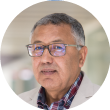

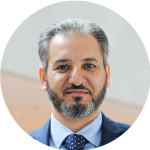 Mr. Mazen Alfarhan
Mr. Mazen Alfarhan